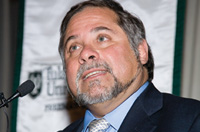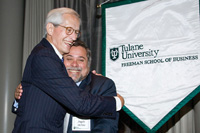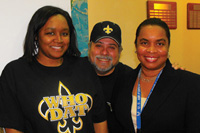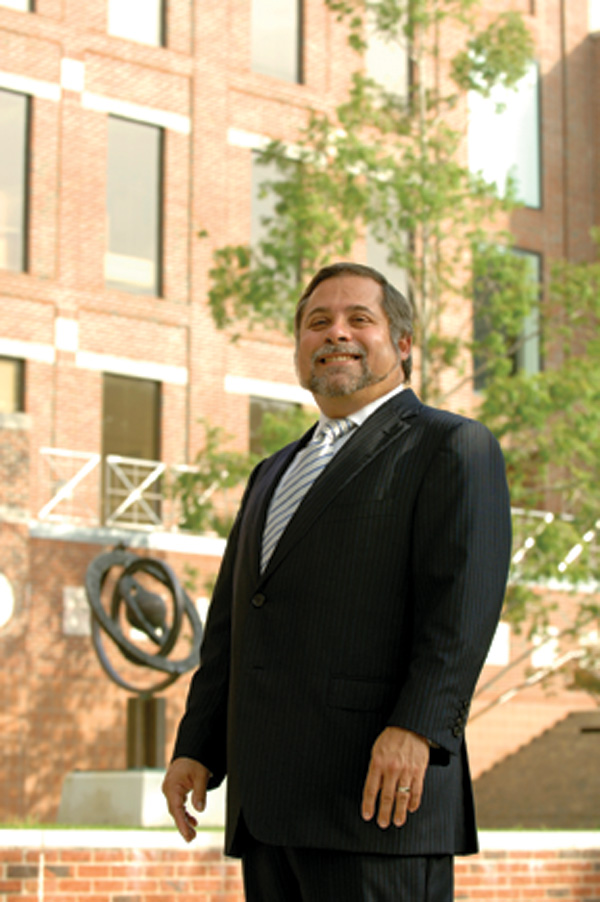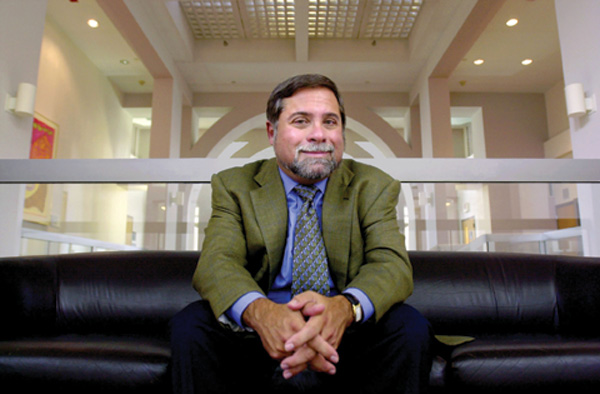
Angelo DeNisi, who stepped down as dean on June 30, looks back on his six historic years leading the Freeman School.
Angelo DeNisi was just a few weeks into his new job as dean of the A. B. Freeman School of Business when he had a revelation.
It was July 2005, and DeNisi was presiding over the Freeman School’s summer commencement ceremony—his first official act as dean of the business school—when he came to a line at the end of his script: “By virtue of the authority vested in me, I hereby confer upon you the degree of Master of Business Administration.”
The line caught him by surprise.
“I grew up in the South Bronx,” DeNisi says. “Nobody in my family went to college. My father was a mailman, and my mother was a high school dropout. And I’m conferring degrees at Tulane University? This is okay.”
DeNisi recalled that moment in late June as he prepared to step down from the job he had held at the Freeman School since 2005.
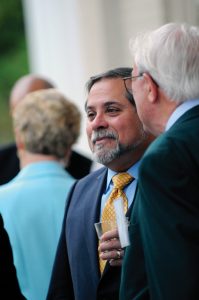 Sitting in his new office on the fifth floor of Goldring/ Woldenberg Hall, where he will resume his teaching and research career as the Albert Cohen Chair in Business and professor of organizational behavior, DeNisi took a few minutes from unpacking to look back on his tenure, six extraordinary years destined to be remembered as among the most significant in school history.
Sitting in his new office on the fifth floor of Goldring/ Woldenberg Hall, where he will resume his teaching and research career as the Albert Cohen Chair in Business and professor of organizational behavior, DeNisi took a few minutes from unpacking to look back on his tenure, six extraordinary years destined to be remembered as among the most significant in school history.
From his initial expectations when he was hired to the unfathomable devastation of Hurricane Katrina to the school’s remarkable recovery in the wake the disaster, DeNisi led the Freeman School through one of the most challenging periods not just in the history of the school but in the history of any business school.
Perhaps the lowest point in DeNisi’s tenure came just a few weeks after that July graduation ceremony. In the wake of Hurricane Katrina, DeNisi was told Freeman would need to slash $1.1 million from its budget for the university to reach its targeted cuts, and the only way to accomplish that would be to fire faculty members.
“I had to call each one of these people on the phone to tell them that they were going to get a registered letter in the mail and they should look at this carefully because what it was going to tell them is that they had just been fired from Tulane University,” DeNisi says matter of factly. “This is what we had to do. There was no good solution. My first official act as dean, other than the July commencement, was to fire faculty. A hell of a way to start.”
But crises also create opportunities, and DeNisi seized the opportunity. In the wake of Katrina, DeNisi recognized that for Freeman to survive, it would need to give students not the same old program but something better, a stronger, more differentiated MBA program.
Two weeks after the storm, DeNisi called together a small group of faculty and staff in Houston and tasked them with building a better MBA program. Free of distractions and focused on the job at hand with a resolve born of the crisis, the group went to work on a Saturday morning. By the end of the day, they had a new MBA curriculum.
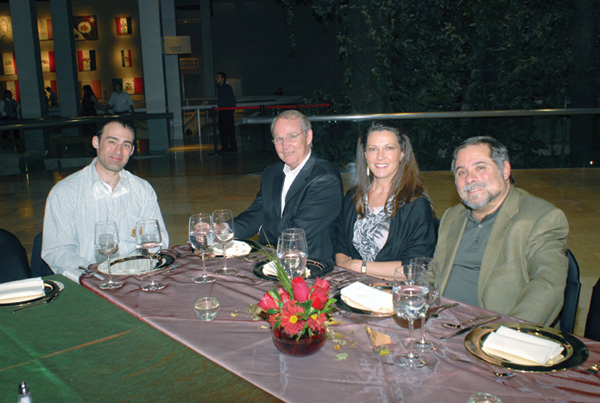
DeNisi, right, with Joel Yarmon (MBA ’08) and associate deans John Trapani and Peggy Babin at a banquet in Monterrey, Mexico, during the first Global Leadership trip in April 2007. DeNisi was instrumental in creating the module, which sends the entire MBA class to destinations in Latin America, Europe and Asia for a week of lectures, site visits and team-based projects.
The new curriculum featured increased integration of core courses and two unique new modules that span the two-year program: Practice of Management, which puts students to work in the community on real-world projects for clients, and Global Leadership, which introduces students to the international business environment and then sends them to the three major business regions of the world—Latin America, Europe and Asia—for weeklong trips that combine classroom lectures, site visits and projects with local clients.
“It was a group of people who said, ‘If we could start from scratch, how could we make the MBA program better?’” DeNisi says. “Part of it was to try to figure out something we could say that made us different. We had all these connections around the world, so it was like, okay, let’s leverage that. And everybody went, ‘Yeah, sounds good.’”
The new curriculum was the first of a number of initiatives introduced by DeNisi. Despite tight post-Katrina budget constraints, DeNisi also oversaw the launch of the Master of Global Management program, which combines students from Freeman and four Latin American universities for classes that emphasize international strategy. Most recently, DeNisi authorized the launch of the new master’s program in energy management.
Even more striking than new programs has been the Freeman School’s success in national ranking surveys, a feat that’s all the more remarkable in light of the loss of faculty and lack of resources in the wake of Katrina. While Freeman has been ranked higher in individual surveys at various points, at no time in history has the Freeman School been ranked as highly in as many national surveys at the same time. For the first time in history, Freeman is ranked in the top 50 for both undergraduate and the MBA program by U.S. News & World Report and Bloomberg Businessweek, the two leading ranking publications. The entrepreneurship program was ranked 13th nationally by Entrepreneur magazine last October, the executive MBA program is ranked 35th nationally and 75th internationally by Financial Times, and the Master of Finance program was just ranked fourth nationally and 26th internationally by Financial Times.
Worth singling out from those rankings is Freeman’s performance in the area of placement. In 2011, U.S. News & World Report ranked Freeman eighth in the nation for MBA placement rate, and in Bloomberg Businessweek, recruiters ranked Freeman 12th for quality of graduates.
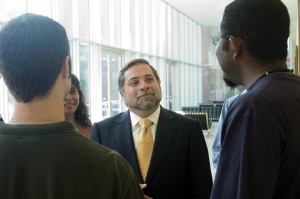 “We managed to do all of this with fewer resources because people—faculty and staff—were willing to work,” DeNisi says. “They put in a lot of time and effort and accomplished some amazing things.”
“We managed to do all of this with fewer resources because people—faculty and staff—were willing to work,” DeNisi says. “They put in a lot of time and effort and accomplished some amazing things.”
One of the things DeNisi says he enjoyed most about being dean was meeting alumni, and one of his fondest memories was meeting Larry Gordon (BBA ’58), producer of Hollywood blockbusters including Field of Dreams, Die Hard and Boogie Nights.
“We sit down and he says, ‘I’m really busy. You can have 10 or 15 minutes,’” DeNisi recalls. “So we start talking about movies—Field of Dreams and movies in general. Two hours later, he says, ‘I gotta get out of here!’
“Meeting people like Larry and spending time with them, that’s what I’ll miss,” DeNisi says. “That’s a great part of the job.”
As for DeNisi’s single most gratifying moment as dean, that honor is reserved for Henry St. Paul (E ’46, MBA ’08).
In 2008, DeNisi got a letter from St. Paul, a retired businessman who had started the MBA program 53 years earlier. St. Paul was one credit shy of earning the degree when he took a break from the program to start his own company. What was supposed to be a short hiatus turned into a career that spanned five decades, and St. Paul never returned to finish his degree. Was there any way, St. Paul asked DeNisi in the letter, that he could earn that final credit and receive his MBA?
DeNisi told him there was, but only on the condition that he show up at the school’s graduation ceremony in May and receive his diploma on stage with the rest of the MBA class.
To earn the credit, DeNisi asked St. Paul to write a thesis on how what he’d learned in business school had helped him through life. DeNisi personally served as St. Paul’s thesis supervisor.
“So, three years ago, after we’d given out all the diplomas in the business school ceremony, there was one more graduate, and an 81-year-old man came up and received his MBA,” DeNisi recalls with a smile. “It was such a great kick to be able to do that, and that was something I got to do because I was dean. So, yes, it was a really, really good job.”

